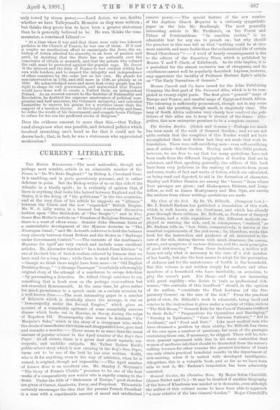The Care of the Sick. By Dr. Th. Billroth. (Sampson
Low.)— Mr. J. Bentell Emlean has published a translation of this work, which is well known on the Continent, and which has already gone through three editions. Dr. Billroth, as Professor of Surgery in Vienna, had a wide experience of the different methods em- ployed in nursing the sick, and, in consequence, "realised," as Mr. Endean tells us, "how little, comparatively, is known of the essential requirements of the sick-room ; he, therefore, wrote this book for the instruction and guidance of all interested in the care of the sick, stating therein with much clearness, the causes, nature, and symptoms of various diseases, and the main principles of good sick-nursing." From these instructions, a mother will learn not only what is necessary to the care of a sick member of her family, but also the best means to adopt for the prevention of sickness and for the maintenance of health in the household. But this volume is not written simply for mothers and other members of a household who have inevitably, on occasions, to play the nurse's part. For those—and they are increasing with great rapidity—who desire to train as professional sick- nurses, "the contents of this handbook should, in the opinion of its author, " constitute the First Lectures (of the Pre- paratory Course) on the care of the sick." From the practical point of view, Dr. Billroth's work is admirable, being lucid and concise in the instruction it gives under a variety of titles, such as "The Sick-Room,"" General Rule for the Care of Patients confined to their Beds," "Preparations for Operations and Bandaging," "Nursing in Epidemics," "Care of Nervous Patients," "Aid in Accidents," and "Food and Diet." Like most medical men who have obtained a position by their ability, Dr. Billroth has views of his own upon a number of questions, but most of the passages containing these can, if necessary, be skipped. There will be, how- ever, general agreement with him in his main contention that women of mediocre intellect should be dissuaded from the nurse's calling, because for other reasons the greatest kindness of heart can only obtain practical beneficial results in the department of sick-nursing, when it is united with developed intelligence. Altogether, this is a valuable book, and so far as we have been able to test it, Mr. Endean's translation has been admirably
executed.






































 Previous page
Previous page